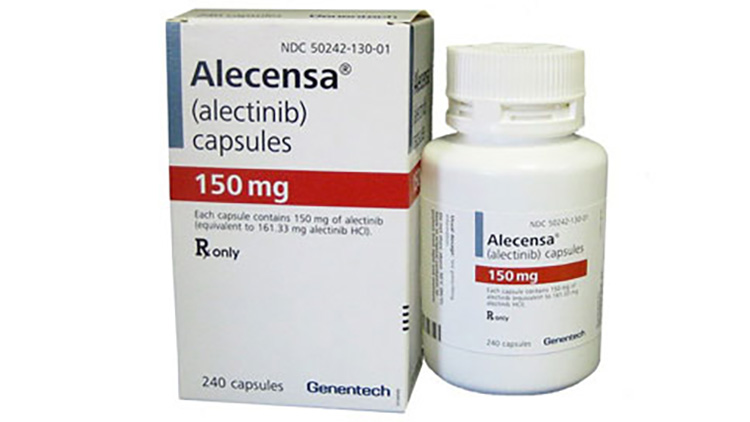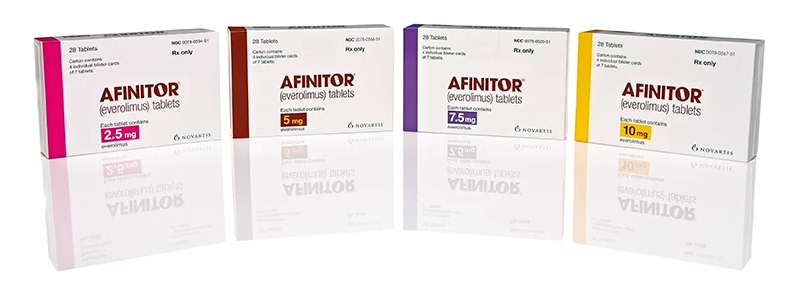Alecensa (alectinib) vs Afinitor (everolimus)
Alecensa (alectinib) vs Afinitor (everolimus)
Alecensa (alectinib) is specifically indicated for the treatment of ALK-positive non-small cell lung cancer (NSCLC) and functions as an ALK inhibitor, targeting the genetic alterations that drive cancer growth in this subset of lung cancers. Afinitor (everolimus), on the other hand, is a mammalian target of rapamycin (mTOR) inhibitor used in various types of cancers, including advanced renal cell carcinoma, certain breast cancers, and neuroendocrine tumors, among others; it is not specifically indicated for ALK-positive NSCLC. When deciding between these two medications, it is crucial to consider the specific type of cancer and its molecular profile, as the efficacy of Alecensa and Afinitor is highly dependent on these factors, and their use should be guided by a healthcare professional's evaluation of the individual's cancer characteristics and treatment goals.
Difference between Alecensa and Afinitor
| Metric | Alecensa (alectinib) | Afinitor (everolimus) |
|---|---|---|
| Generic name | Alectinib | Everolimus |
| Indications | ALK-positive metastatic non-small cell lung cancer | Advanced hormone receptor-positive, HER2-negative breast cancer; advanced neuroendocrine tumors; renal cell carcinoma; tuberous sclerosis complex-associated seizures, subependymal giant cell astrocytoma, and renal angiomyolipoma |
| Mechanism of action | ALK inhibitor | mTOR inhibitor |
| Brand names | Alecensa | Afinitor, Afinitor Disperz |
| Administrative route | Oral | Oral |
| Side effects | Fatigue, constipation, edema, myalgia, anemia | Stomatitis, infections, rash, fatigue, diarrhea, edema |
| Contraindications | Hypersensitivity to alectinib or any component of the formulation | Hypersensitivity to everolimus, other rapamycin derivatives, or any component of the formulation |
| Drug class | Tyrosine kinase inhibitor | mTOR inhibitor |
| Manufacturer | Genentech (Roche) | Novartis Pharmaceuticals |
Efficacy
Alecensa (Alectinib) Efficacy in Lung Cancer
Alecensa (alectinib) is a targeted therapy approved for the treatment of non-small cell lung cancer (NSCLC) with specific genetic alterations, namely the anaplastic lymphoma kinase (ALK) positive mutations. The efficacy of Alecensa in treating ALK-positive NSCLC has been demonstrated in several clinical trials. In these studies, Alecensa has shown a significant improvement in progression-free survival (PFS) compared to other treatments such as chemotherapy or crizotinib, another ALK inhibitor. Patients treated with Alecensa often experience a delay in the progression of their lung cancer, and in some cases, a reduction in tumor size has been observed.
In the ALEX trial, a pivotal phase 3 study, Alecensa was compared directly with crizotinib in previously untreated patients with ALK-positive NSCLC. The results indicated that Alecensa significantly reduced the risk of disease progression or death by 53% compared to crizotinib. Moreover, Alecensa was found to be more effective in controlling central nervous system (CNS) metastases, which is a common complication in ALK-positive NSCLC patients.
Afinitor (Everolimus) Efficacy in Lung Cancer
Afinitor (everolimus) is an mTOR inhibitor that is primarily used to treat various types of tumors, including certain forms of lung cancer. In the context of lung cancer, Afinitor's efficacy has been explored in patients with advanced non-small cell lung cancer (NSCLC) after the failure of previous chemotherapy regimens. While Afinitor is not specifically approved for first-line treatment of lung cancer, its effectiveness has been evaluated in clinical trials and off-label use.
Studies have shown that Afinitor can provide clinical benefit in terms of disease stabilization and, in some cases, partial responses in patients with NSCLC. However, the overall impact on survival outcomes such as progression-free survival (PFS) and overall survival (OS) is modest when used as a single agent. Afinitor's efficacy in lung cancer may be enhanced when used in combination with other treatments, such as angiogenesis inhibitors or targeted therapies, but this is an area of ongoing research and not yet a standard of care.
Regulatory Agency Approvals
Alecensa
-
European Medical Agency (EMA), European Union

-
Food and Drug Administration (FDA), USA

-
Health Canada

-
Pharmaceuticals and Medical Devices Agency (PMDA), Japan

-
Therapeutic Goods Administration (TGA), Australia

-
Medsafe (NZ)

Afinitor
-
European Medical Agency (EMA), European Union

-
Food and Drug Administration (FDA), USA

-
Health Canada

-
Pharmaceuticals and Medical Devices Agency (PMDA), Japan

-
Therapeutic Goods Administration (TGA), Australia

Access Alecensa or Afinitor today
If Alecensa or Afinitor are not approved or available in your country (e.g. due to supply issues), you can access them via Everyone.org.
How it works

Make an enquiry
Choose the medicine you want to buy, answer a couple of questions, and upload your prescription to speed things up. We’ll get back to you within 24 hours.


Make an enquiry
Choose the medicine you want to buy, answer a couple of questions, and upload your prescription to speed things up. We’ll get back to you within 24 hours.


Breeze through the paperwork
We'll guide you through the required documents for importing unapproved medicine, ensuring you have all the necessary information.


Get a personalized quote
We’ll prepare a quote for you, including medicine costs and any shipping, administrative, or import fees that may apply.


Receive your medicine
Accept the quote and we’ll handle the rest - sourcing and safely delivering your medicine.

Some text on this page has been automatically generated. Speak to your physician before you start a new treatment or medication.
Let's talk
If you have any questions, call us or send us a message through WhatsApp or email:
Contact us




